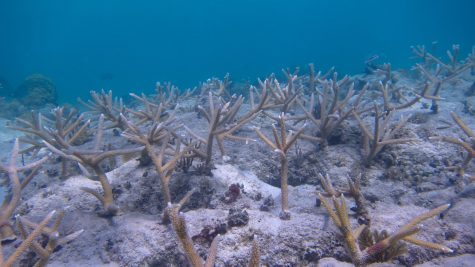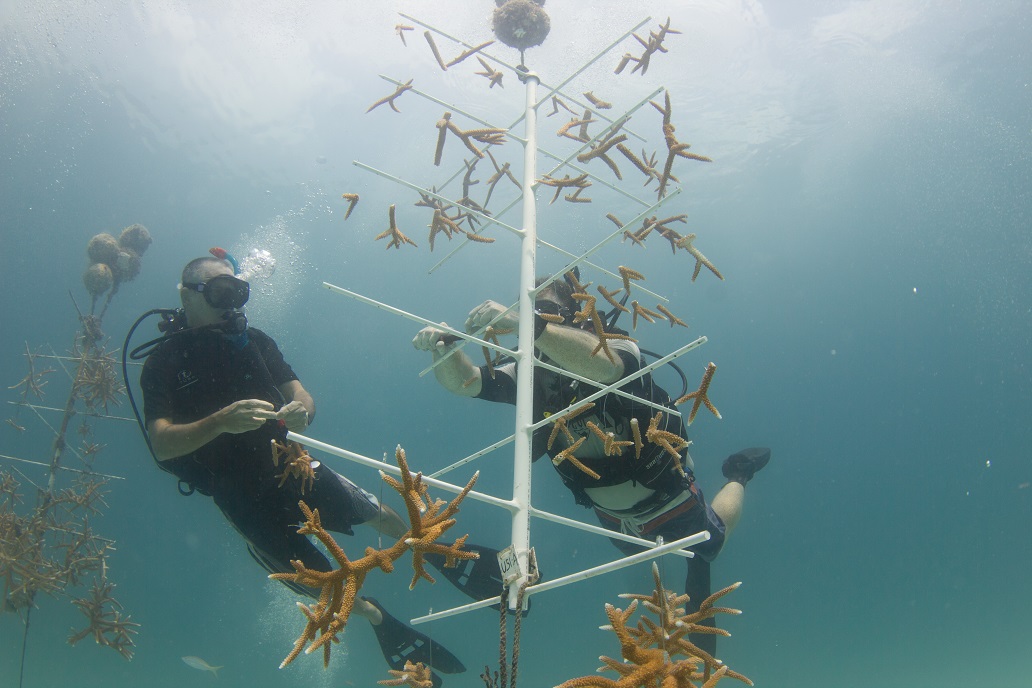Coral Catastrophe: How you can help
March 24, 2022
Coral reefs around the world are dying out, but individuals, even those who don’t live near the ocean, can make a difference.
National Oceanic and Atmospheric Administration (NOAA) is an organization that provides safety and help for coral reefs. They are gardening, growing, and planting millions of new coral species and ecosystems all over the world to help restore them. They work with sponsorships to help collect and detached coral and regrow them in coral nurseries. More than 20 of NOAA coral nurseries are active throughout the Caribbean and provide more than 40,000 new and healthy corals for reef restoration throughout the region.
Jennifer Moore is serving as the co-lead for Mission: Iconic Reefs and she is helping with the restoration of coral reefs. She started working for NOAA in 2003.
Moore said, “Coral restoration has been a tool in coral conservation for about 15-20 years. In response to the massive decline in Caribbean corals over the past few decades, the science and conservationists community identified that more needed to be done to help reverse the decline.”

NOAA is also coming up with ways to use and explore new techniques for growing and planting genetically diverse populations of coral species that can adapt to the changing environmental conditions. A recent study by NOAA shows that interventions could accelerate coral evolution and could buy time for them to adapt while ocean conditions continue to change.
Moore said, “there are a multitude of threats to coral reefs, with the largest linked to climate change: coral bleaching caused by increasing ocean temperatures and ocean acidification caused by elevated levels of carbon dioxide in the ocean surface waters. Coral reefs are also threatened by land-based sources of pollution and overfishing.”
More species of corals are more affected than others. This can be productive to the study of which corals are more resistant than others.
Moore said, “Most stony corals are affected by these threats, but within species, there are different individuals that are more or less able to deal with the threats. Just like in humans some people react differently to different diseases. This is good news because we can study what makes a particular coral more resistant or resilient to different threats and use the knowledge to inform restoration efforts.”
Here are ten things you can do to help the reefs from a difference
- Don’t give corals as a gift, that is stripping them from their natural environment
- Conserve water. The less water you use, the less runoff and wastewater that will eventually find its way back into the ocean
- Volunteer in local beach or reef cleanups. If you don’t live near the coast, get involved in protecting your watershed
- Become an informed consumer and learn how your daily choices such as water use, recycling, seafood, vacation spots, fertilizer use, and driving times can positively impact the health of coral reefs.
- Check sunscreen ingredients. Some ingredients in sunscreen are chemicals that harm marine life and reefs such as; oxybenzone. This chemical is found in over 3,500 sunscreen products around the world. Some of these products are; Blue Lizard, Neutrogena, Aveeno, MDSolarSciences, etc. Click here for a list of good sunscreens
- Energy-efficient light bulbs reduce greenhouse gas emissions.
- If you dive, don’t touch. Coral reefs are living organisms, so if you touch them, some sediments can smother corals.
- Be a marine crusader. In addition to picking up your own trash, carry away the trash left behind by others.
- Don’t put chemicals in the direction of the ocean. Nutrients from excess fertilizer increases algae growth and blocks sunlight to corals.
- Practice safe boating. Anchor in sandy areas away from corals and seagrass so that the anchor doesn’t chip away at the reefs below.
